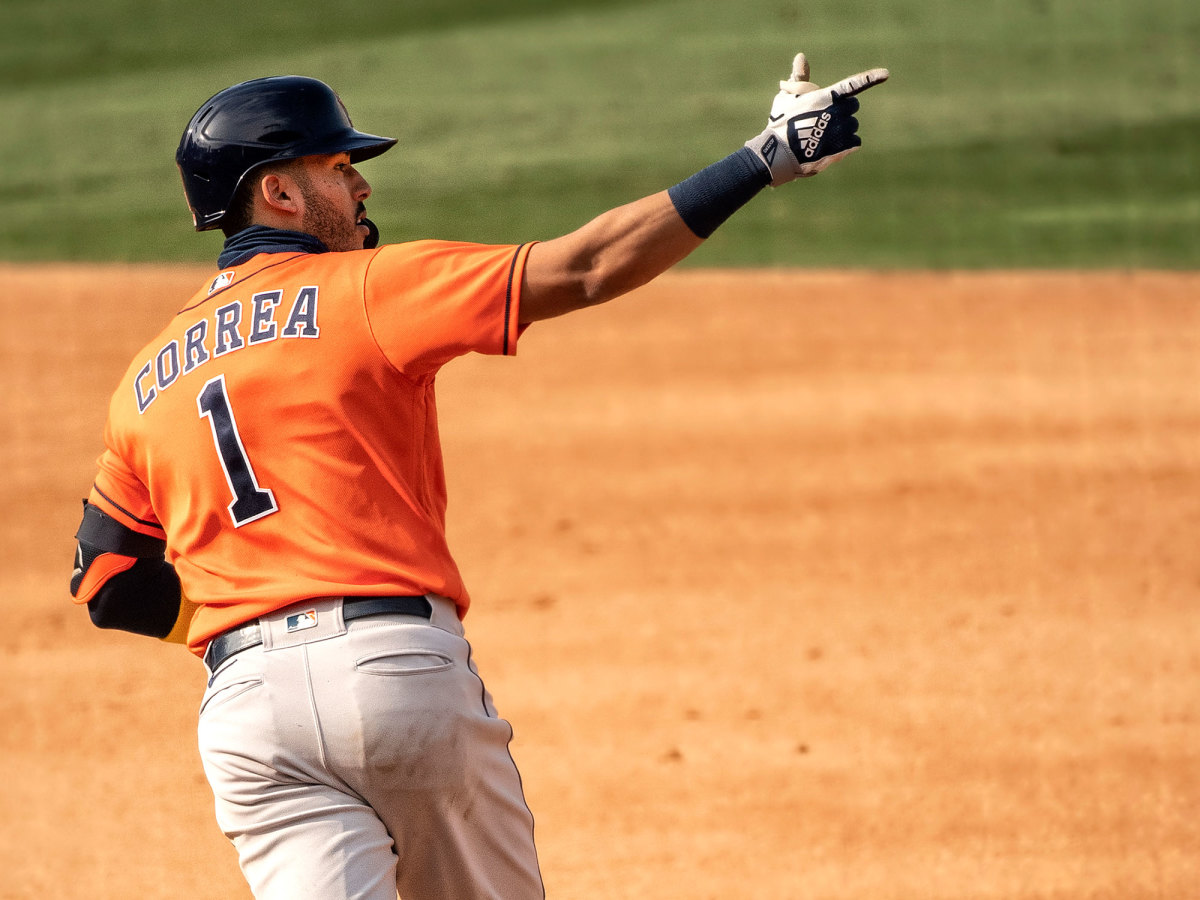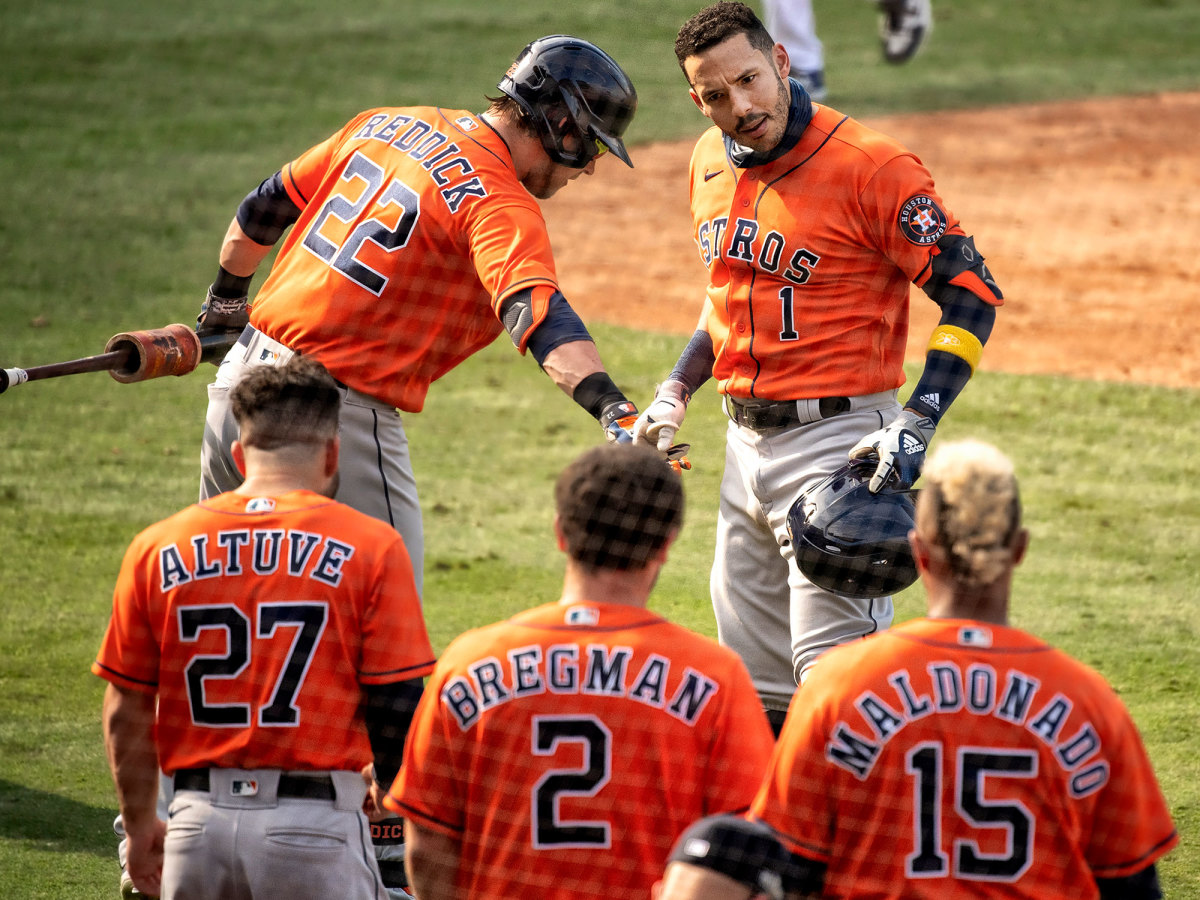How Should We Feel About the Astros in 2021? It's Complicated
First, a quiz. The Houston Astros are:
a) A team that finished 2020 just a game away from the World Series—a team that finished 2019 just a game away (seven outs, really) from winning the World Series—and still has a solid chunk of its core intact
b) A team that finished last season with a losing record, struggled with subpar performances from some of its biggest stars and now has to watch its biggest free agent walk away
c) A team that proves the difficulty of projecting anything after a pandemic-shortened micro-season
The answer doesn’t particularly matter. (You can make an acceptable case for “all of the above,” or “none of the above,” or any of the above.) The point lies simply in the fact that the question is worth asking. The 2020 Astros were similarly hard to pin down: “Injury-ravaged team makes the playoffs despite a losing record and goes surprisingly far” would have been the perfect underdog story if, in fact, the team had felt more like an actual underdog and less like a wrestling heel. Their role in 2021 is just as murky. Even as their offseason took shape this week—re-signing outfielder Michael Brantley and, as expected, not re-signing top free agent George Springer—it’s still difficult to pinpoint their trajectory.
These Astros are not the same ones who dominated their division with maddening precision for most of the last few years. But they’re also not quite … not. So who are they? There’s no clear answer to this question, either, but here are a few of the possibilities.

a) A Division Favorite and Serious Contender
Sure, this would require a sizable step forward from last season. But who’s to say that last season, with its irregular schedule and unique pressures, wasn’t just an anomaly? It doesn’t take too much squinting to see a world where José Altuve and Yuli Gurriel bounce back after their dreadful seasons at the plate in 2020. The health issues that were so vexing for the team last year should be less pressing—Yordan Álvarez, who missed almost all of 2020 after being Rookie of the Year in 2019, should be back, and it’s hard to believe that the bullpen could be so ravaged by injuries that it would need to be patched up with a handful of rookies again. And while the rotation faces another year without Justin Verlander, who’s recovering from Tommy John surgery, this was generally a bright spot last season regardless and will see all of its members return.
There are other reasons for optimism. There’s the fact that the Astros brought back Brantley—a remarkably consistent performer at the plate and still a capable corner outfielder. And then there’s the lack of activity in the rest of the division. While the A’s are a stacked team, they’re not a particularly deep one, and it’s not too hard to imagine them being overtaken for the top spot with the right breaks. The Angels have been just about completely silent outside of acquiring closer Raisel Iglesias. Several of the other teams that should be fighting for control of the American League have been similarly dormant. This certainly doesn’t leave a clear path for the Astros, but it’s a markedly less cluttered path than it could have been, and it doesn’t take too much magical thinking to picture a deep run for Houston. The best-case scenario here is still not anything like the 2019 Astros—but, given the landscape, it doesn’t have to be.
b) A Wild-Card-ish Team
The previous answer didn’t require the bullpen to be great. But it did require it to be functional, and, well, it’s not too hard to imagine a version of this bullpen that isn’t. The team has made some efforts to upgrade so far this winter—Pedro Báez and Ryne Stanek were added earlier this month—but that might not be quite enough if Houston is dealt some more bad luck with injuries or underperformance.
Most of the big names here are absent. Roberto Osuna, Brad Peacock, and Chris Devenski are all gone, while hip surgery will rule out at least the start of the season for Josh James. That doesn’t mean that there isn’t capacity for some strong performances here. (Ryan Pressly’s still around, and Blake Taylor and Enoli Paredes were pleasant surprises last season.) But it’s not a group with enough depth to give them much margin for error.
Pair a potentially shaky ‘pen with an offense that fails to bounce all the way back to its pre-2020 levels, a rotation that gets hit with a poorly timed injury or bad stretch, and you’d be looking at a Houston team that’s certainly not terrible … but it may not be that much better than last year’s losing effort, either.

c) A Hot Mess
Or maybe 2020 wasn’t an anomaly. Maybe those struggles were indicative of something more serious. Perhaps Altuve really is this lost at the plate and Carlos Correa has another uneven year. Maybe Zack Greinke begins to show his age more seriously while some of the more inexperienced members of this rotation flail. This team is not set up to lose, certainly. But it is a team that lost last year—and one that has now had an offseason whose biggest move is losing George Springer. Would it take some particularly bad luck for everything to fall apart on them in 2021? Sure. Would it be out of the realm of reasonable possibility? Definitely not.
d) A Team You’ll Probably Still (Love to) Hate
But you might be looking for the answer to a different question altogether. Maybe it’s not what the Astros will look like—maybe it’s how you should feel about them. It’s still a loaded question; 2020, after all, was supposed to be a season when the team would have to grasp the fallout from the sign-stealing scandal that had unraveled over the previous winter, but with fans absent, what seemed urgent in March felt much less so by the time the season finally started in July. (Despite the best efforts of Joe Kelly.)
Yet the biggest factor here was neither the passage of extra time nor the lack of fans. It was the fact that the 2020 Astros… weren’t as naturally hateable as baseball might have assumed they would be! It’s hard to play the role of villain if you’re not actually good. A conscious choice to hate on the Astros—injury-stricken, not playing like themselves, now under the stewardship of the very un-hateable Dusty Baker—might have felt like a misdirection of emotion. (It probably felt better directed in October, to which they gained entry only by the skin of their teeth, but immediately saw them start winning and start talking about it.) If 2020 was supposed to be a year of vindication for Astros-haters—a time to hate publicly and feel righteous about it—the season turned out to be the opposite
Which leads us to 2021—a year removed from the initial revelation of the scandal, four years removed from the crimes themselves, and yet this team still looks like the closest thing that baseball has to a villain. These Astros look different from the ones you probably hate. They’ll play different.
You can still hate them, of course, as a matter of principle. But you might not have to.
